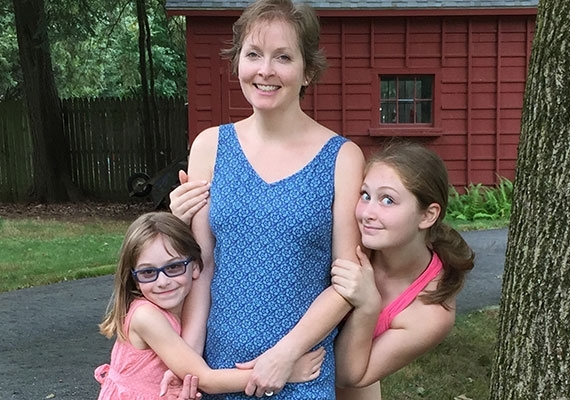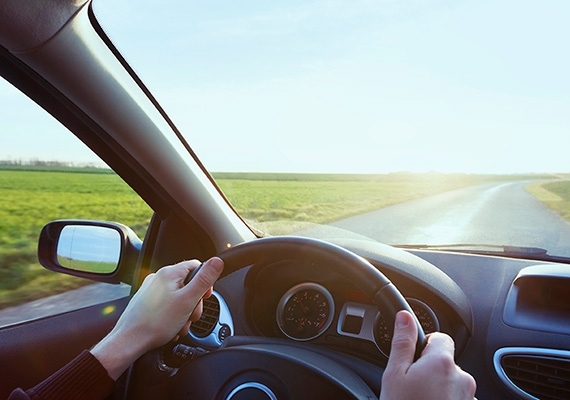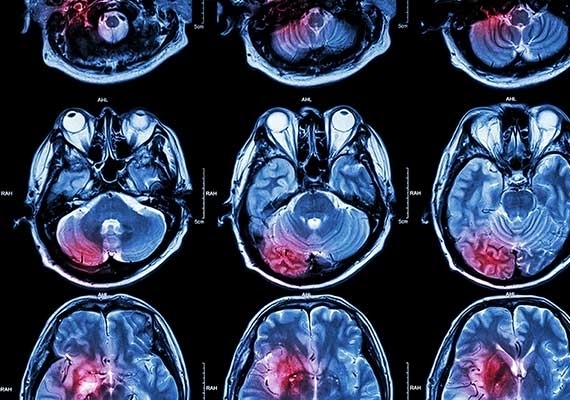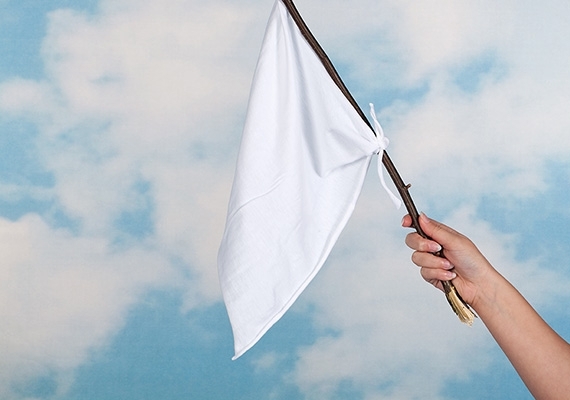By Kristen Domonell, Prevention.com
(Photo: Courtesy of Jill Stein)
Jill Stein thought she was too young and healthy to be having a stroke. She was wrong. This is her story.
People can't believe it when I tell them I'm recovering from a stroke. After all, I'm only 44, I eat well and exercise, and I don't smoke or have a single stroke risk factor. But April 11, 2015, is the day when I realized a stroke could happen to anyone--even me.
I woke up the day before feeling really tired and off. As a resource coordinator at the Osher Center for Integrative Medicine at Northwestern University in Chicago, I'm in charge of running the fitness and wellness class program offered at Northwestern Medicine. That morning I taught three group fitness classes, which makes me feel tired and hungry on a good day. I usually feel refreshed after my lunch break, but that day lunch didn't make me feel energized. I asked a medical assistant in my office to check my blood pressure, but everything looked fine. I eventually told my manager I needed to go home early because I wasn't feeling well.
I thought I was getting the flu.
Driving home, it was really hard to concentrate on the road. Driving is usually easy for me, even in the city, but I felt like I had to be extra focused and my muscle response was not very smooth. I picked my children up from school and had to ask them not to distract me because I was having trouble driving. I didn't know what was going on, but thought maybe I was coming down with the flu or something else really bad. (You're not too young to have a stroke. Here are five signs to watch for.)
By the time I was putting my younger daughter to bed, my balance was going and my teenager needed to help me up the stairs. The fatigue was getting heavier and heavier, and I spent the night napping and getting up to get food because I felt really depleted. I even had to go up and down the stairs on my tush. At 3 a.m. on Saturday, I got up one last time and resorted to drinking half a Gatorade, which I never do, because my electrolytes just felt really depleted. I slept for 3 more hours, and when I woke up my balance was still off, but this time the left side of my body wasn't cooperating with me. I never felt numbness or a lack of sensation, but my left hand, hip, and leg were very sluggish.
(Looking to take back control of your health? Prevention has smart answers--get a FREE trial + 12 FREE gifts.)
At this point you may be thinking, of course you had a stroke, Jill, go to the hospital! But instead I went to Target to run an errand. I'm a fitness instructor, I'm very healthy, and I had just turned 44. It was not in the realm of possibility that I had had a stroke, or so I thought. As the morning went on, I realized the left side of my mouth was pulling down and my speech was slightly slurred. I started texting some of my girlfriends who are doctors, and they encouraged me to go get looked at. My husband drove me to an immediate care center near our home, but after taking one look at me they told me to go to the emergency department.
When I got to the emergency department at Northwestern Memorial Hospital, no one knew what to think. The neurologists knew I had no risk factors and thought it was unlikely I'd had a stroke, but they ordered an MRI right away. I was given IV fluids, which quickly helped the left side of my body. When the doctors came in to tell me the MRI showed I had indeed had a stroke in part of the right brain stem (which is why my left side had been affected), I was in shock. It was almost like it was a joke, it was so strange.
The doctors believe my stroke happened sometime between when I woke up at 3 a.m. and when I woke up at 6 a.m. with a weak left side. They say the symptoms I was experiencing prior was likely what is known as a prestroke event.
I'm not as uncommon as you might think.
No one was more surprised than I was that I had a stroke, but incidences of stroke in young and healthy people are on the rise. Each year, 800,000 Americans have a stroke, and stroke is the fifth leading cause of death in the United States, according to the Centers for Disease Control and Prevention (CDC). Recent studies have found that about 10 percent of strokes happen in people under the age of 50, like me. And about 55,000 more women than men have a stroke every year, according to the National Stroke Association.
While age, race, gender, family history, past stroke or heart attack, high blood pressure, diabetes, and smoking are some of the well-known risk factors for stroke, for many people it's difficult to pinpoint the cause of a stroke. My stroke, like a third of all strokes, is considered cryptogenic, meaning doctors don't know what caused it. A small lesion was found on the inside of the aortic valve of my heart, which could be to blame, but the doctors can't know for sure.
Recovery is rough.
I ran an event for 250 attendees two weeks to the day after my stroke. I was still in shock, and I was burying myself in work because it helped. It was normalcy, and it was something I could do and do well, so it gave me a sense of accomplishment. At that point, I was just trying to cope with what had happened minute by minute.
I'm still not sure how I did anything I did those first weeks and months after my stroke. I was in a major brain fog for about 8 weeks, and I felt like I was running on autopilot. I was functioning, but the fatigue was so strong and I was dealing with so many other side effects, like trouble swallowing and weakness, that I'm not sure how I got anything done.
After being discharged from the hospital, I was prescribed occupational therapy to regain my hand, arm, and shoulder strength and physical therapy for everything else. When I first started physical therapy, I was very impaired at that left hip and shoulder. My balance was awful, and I would trip over my left toes regularly because my entire left leg, including the muscles in the shin that help you lift your toes, was affected by the stroke.
Between physical therapy and teaching my group fitness classes at work, I was making improvements weekly. But when I would get tired toward the end of the day, my speech would become slurred and I'd find my left leg collapsing. It was several months before that would clear up.
Since the stroke, I've also been having trouble swallowing, which is very common after a pons stroke. For a while, it was so bad I could only eat pureed or very soft food. I couldn't mix textures or eat foods with any kind of density. Several times I had to pull food out of my throat because I was choking on it. For the past two months I've been going to swallowing therapy, which has allowed me to incorporate more variety back into my diet, but I still have to focus on the act of swallowing much more than the average person.
While I pride myself on being a good driver, driving was one thing I didn't feel comfortable doing until June. I started slow, driving a little bit around my neighborhood. By mid-July, I had worked up the courage to drive on the highway again. To this day, five months later, I still don't feel like it's safe for me to drive in the evenings at all. At that point in the day, I'm so tired and foggy that I feel like I could be putting myself, my children, and other drivers at risk.
I've learned some things.
While I'm no longer having as much trouble swallowing and I'm regaining my strength, fatigue is still a very present piece of my recovery. One thing this experience has taught me is to say no, which was something I was terrible at before. I felt like I had to be a super mom, super employee, and super everything, and it's really taught me to prioritize and make sure that I'm listening to my own needs and respecting my limits. The fatigue I feel is such a rock-solid barrier. I can't push through it, so there's no choice but to listen to my body and give myself time to rest and care for myself.
Asking for help is also something I've gotten better at. I was hesitant to accept help at first, but as soon I found out that my heart health could be a real concern, one of the first things I did was call my mother, who lives in Massachusetts, and ask when I could take her up on her offer to stay with me and help out. She stayed in Chicago for 10 weeks, which helped to take some of the weight off my husband, my children, and myself.
Related: 60-Second Fix For A Stiff Neck
What you need to know
One of the biggest lessons I've learned from this experience is just how little people actually know about strokes. Working in a health care setting, I know the symptoms of a stroke (numbness or weakness of the face, arm, or leg; confusion and trouble speaking or understanding; trouble walking, dizziness, or loss of balance; severe headache with no known cause; face drooping). But I still didn't think I was having a stroke because I had no cognitive impairment or confusion. Like me, a third of stroke patients don't call an ambulance to get them to the hospital -- either because they don't realize they're having a stroke or they don't realize how much danger they're in -- according to a 2013 study published by the American Heart Association.
Time is a big issue with strokes, and seeking out care as soon as you can is key. Many people who are feeling like I did wait, saying, "I'll give it a couple of days. I'll see how I feel tomorrow." But if an injection of a medicine called tissue plasminogen activator (tPA) is needed to break up a clot, it must be given within four hours of the start of symptoms to work properly, so people often have worse outcomes because of lack of awareness. I was not in a situation where I needed to have tPA because my clot was already gone.

(Photo: Getty Images)
Learning that I had a stroke is hard for others to stomach, too. The reaction that I have had from every single person I've told is shock, horror, and disbelief. People don't understand that strokes can be so different for each individual. Even though more people have strokes than have heart attacks each year, there is a general lack of understanding across the board about symptoms, risk factors, who can have a stroke, what you should do when you have one, and what the recovery is like. It's shocking for people when they realize that anyone of any age can have a stroke, even if they have zero risk factors. I think that's a huge lesson others can learn from my experience.
By Kristen Domonell, Prevention.com
This article 'This Is What It's Like To Have A Stroke At 44' originally ran on Prevention.com.
More from Prevention.com:
8 Things That Happen When You Finally Stop Drinking Alcohol
5 Signs You're Not Getting Enough Vitamin D
10 Things Your Breasts Say About Your Health
9 Proven Ways To Lose Stubborn Belly Fat
16 Signs Your Thyroid Is Out Of Whack

